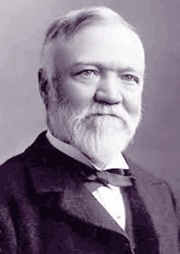On this date in 1835, tycoon turned philanthropist Andrew Carnegie was born in Dumfermline, Scotland. In 1848 he traveled with his family to Allegheny, Pa. He entered the workforce at 13 as a bobbin boy in a cotton mill, worked at Western Union and the Pennsylvania Railroad, then founded the Keystone Bridge Works and the Union Iron Works in Pittsburgh. In his book The Gospel of Wealth (1899), he proposed that the rich are obligated to give away their fortunes.
He began his philanthropy in his 30s, first endowing his native town, and eventually establishing seven philanthropic and educational corporations. His principal desire was to promote free public libraries. When he started that campaign in 1881, they were scarce in the U.S. His $56 million built 2,509 libraries. By the time of his death he had given away more than $350 million.
Carnegie rejected Christianity and sectarianism and was delighted to replace those views with evolution: “Not only had I got rid of the theology and the supernatural, but I had found the truth of evolution,” he wrote in his 1920 autobiography, published the year after his death. After encountering missionaries on a voyage to the Pacific, Carnegie wrote humorously in his diary that he would “never forgive” the missionary for a particularly ridiculous sermon. When applied to for money by those same missionaries to China, Carnegie wrote them: “I think that money spent upon foreign missions for China is not only money misspent, but that we do a grievous wrong to the Chinese by trying to force our religion upon them against their wishes.” (Carnegie to Ella J. Newton, Foochow, China, Nov. 26, 1895.)
His attitude toward religion softened later in life when he attended a Presbyterian church pastored by Social Gospel exponent Henry Sloane Coffin and had a brief correspondence with the eldest son of the founder of the Bahá’í faith.
He did not want to marry during his mother’s lifetime. After she died in 1886, the 51-year-old Carnegie married Louise Whitfield, 21 years his junior. They had their only child in 1897, a daughter named after his mother Margaret. He died at age 83 of bronchial pneumonia at his estate in Lenox, Mass. (D. 1919)

